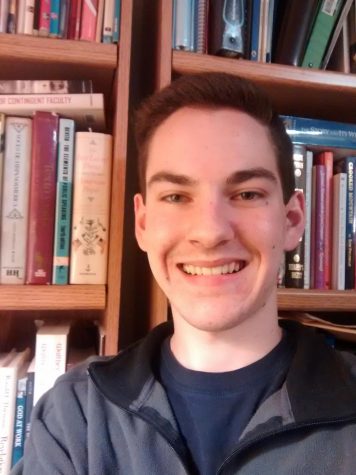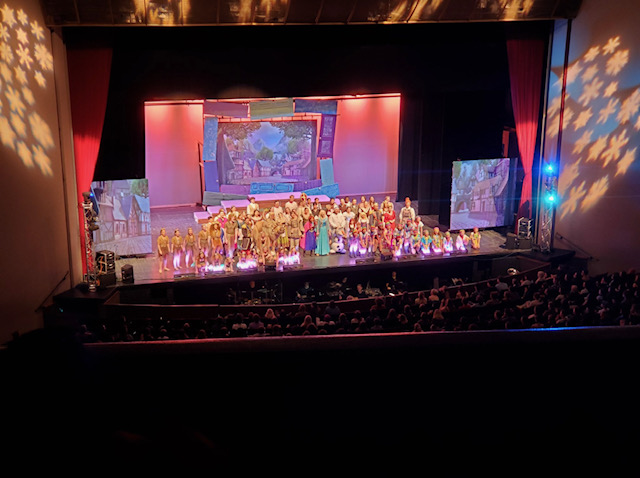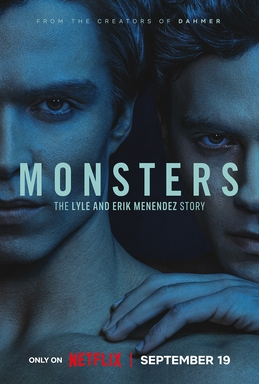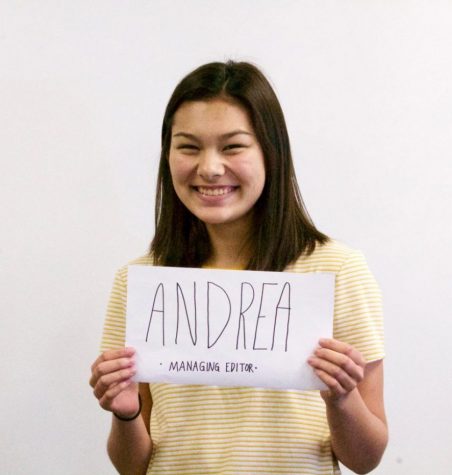National Novel Writing Month
Two Students Attempt to Write a Novel in One Month
December 14, 2017
Every year, over 300,000 writers internationally compete to complete a 50,000 word novel in one month. This event, called NaNoWriMo (National Novel Writing Month), takes place every November. In order to meet the word goal, one must write 1,667 words each day- a hefty load for people with lives to live and jobs to do. Anyone can do NaNoWriMo; the professions of the participants vary from professional author to cybersecurity consultant. Participants of the 2017 event include two students at Olathe East- Rachel Glass and Timothy Schmidt.
Rachel Glass, sophomore, has participated in NaNoWriMo twice: once in 2016 and again this year. Despite her timely commitments to theatre, she has decided to write a second novel. To come up with ideas for her novels, she refers to current events as well as her own thoughts. 
“I usually look to what I am currently thinking about… It’s mostly what I see on TV, a lot of that gets put into ideas and what I think personally-as a kid-what I wanted as a story.”
She also stated that her previous novel completed in 2016 featured an allegory to the American government and election system.
To prepare for a whole month of frenzied writing, Glass develops her novel before November commences. For her, the development process involves creating well-thought-out characters and a sketch of the plot.
“I actually have a NaNoWriMo booklet thing and [in it] … you figure out who your protagonist, your antagonist, [and] your supporting characters are and it helps you to get a solid foundation for your book before you actually start writing… I usually have a beginning and ending in mind, and then a few key points in the middle, and I find myself along the way,” Glass said.
She shared her experiences from NaNoWriMo 2016, including personal insights and struggles.
“Towards the end it got a little stressful, when you start thinking about deadlines and how many days you have left, but you don’t do it unless you have fun writing. One of the struggles I had was trying to work past myself, trying to not be a perfectionist with what I was doing and put a story out on paper,” Glass said.
After completing her novel Terraform, she went through what many NaNoWriMo participants call the “What Next?” months. In these months, writers run their drafts through editors and comb out plot holes and errors. Many novels written during NaNoWriMo have become published literature: Sara Gruen’s Water for Elephants, Rainbow Rowell’s Fangirl, and Marissa Meyer’s Cinder. Glass hopes to join the ranks by becoming a published author. According to Glass, the publishing process is neither quick nor easy.
“First, you have to get a literary agent. And that takes a while because you have to go through a couple and almost all of them take six weeks to respond to you. Right now I am actually talking to the literary agent that helps with John Green books and she’s going to respond to me in two more weeks. And after that, the literary agent helps you contact publishers and publishing houses and they can help you get your book submitted for awards,” Glass said.
“Don’t be worried about the word count. And don’t be worried about where your story’s going, the words are going to come,” Glass said.
 Senior Timothy Schmidt plans on completing his debut novel, The Global Wars, during NaNoWriMo. He has wanted to put his ideas into writing for a year, and decided that this November would be the month to do it. Inspiration for The
Senior Timothy Schmidt plans on completing his debut novel, The Global Wars, during NaNoWriMo. He has wanted to put his ideas into writing for a year, and decided that this November would be the month to do it. Inspiration for The
Global Wars was drawn from dystopian novels as well as the Percy Jackson series. Schmidt prepared for this undertaking using a unique combination of methods.
“I feel like if I can come up with a chapter title for each chapter, I feel like that gives me an overview of where I want to be at for each chapter. I also enjoy graphic design so I’ve designed logos and book covers, that sort of thing, and that gives me a visual to pair to my ideas so I don’t forget things I want to write down,” Schmidt said.
NaNoWriMo rigorously tests the time management skills of its participants. For Schmidt, college and scholarship applications have challenged NaNoWriMo for priority. He added it feels nice when he does find time to write.
Two of the core challenges NaNoWriMo presents, the imposing word goal and tight time constraints, antagonize Schmidt daily.
“That’s the main problem, getting situated with nothing else on my mind so I can just sit down and think about what I’m writing. What ends up happening is I’ll just sit there, I’ll stare for a long time, I can feel the minutes ticking, and the word count’s going. That can also be a little annoying to me- I want to try and keep up with the goal, but I haven’t been so far. It’s a little stressful for me to try and keep the word count and try and reach the goals I’m supposed to,” Schmidt said.
NaNoWriMo doesn’t end after November, though. During the “What Next?” months, he plans on continuing to improve his novel.
“If I could finish my novel, I definitely would want to get it to an editor. I would definitely go to my parents first; they’re both good editors, I want to see what they think because they know me well but then if I am really satisfied with my work, I’d love to send it off to an actual editor somewhere, [to] see what they have to say. And of course, we’re being very hypothetical here but…I wouldn’t mind getting my book published if I could get that done. That’s way down the road,” Schmidt said.
Andrea Shehi // Staff Writer

































